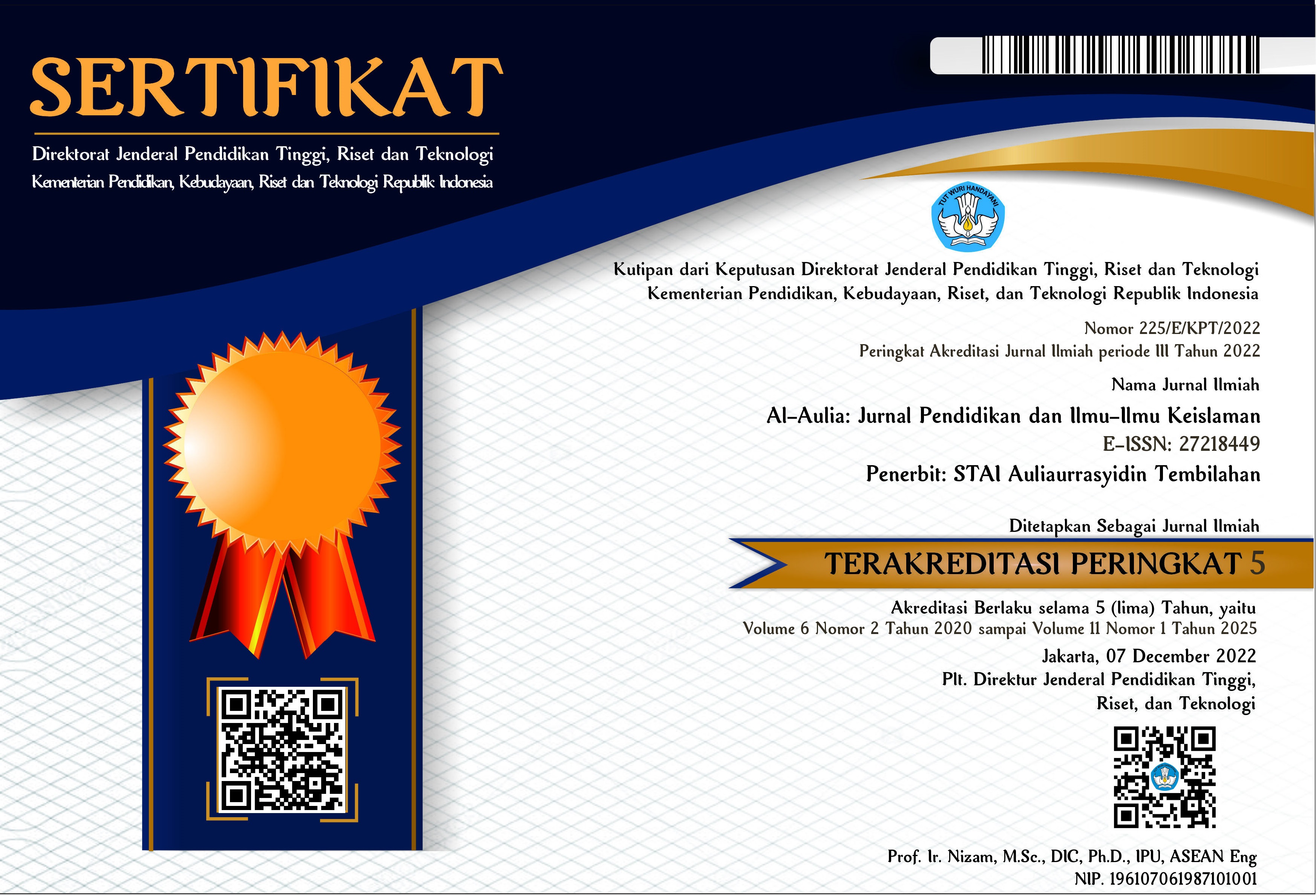Konsep Pemikiran Pendidikan Akal Ibnu Sina pada Anak Pra Aqil Baligh
Keywords:
Education, Ibnu Sina, Pra-Aqil BalighAbstract
Baligh is the last stage of development of an individual according to the perspective of Islamic studies. This means that if a person has reached puberty, then a child is said to be mature physically, intellectually and emotionally as mentioned by Abu Zahrah that child development is divided into 4 stages, namely first Ash-Shobiy or At-Tifl (small children), second Mumayyiz (able to distinguish something), the third is Cheapiq (towards the age of puberty) and the fourth is Baligh. Ibn Sina was a polymath, who gave birth to many works of thought, including in the field of Education. Several studies on Ibn Sina's educational thoughts have been widely explored and published. Idris Irsyad revealed Ibn Sina's concept of goals, curriculum, methods and how to become a competent teacher. This research uses a literature study method, the object of this research is the concept of reason according to Ibn Sina. The method of data collection is a literature study by carrying out literal descriptions that support theories about intellectual education that affect pre-aqil baligh children.
References
Baharuddin, A. (2015). Ibnu Sina dan Pemikiran Teori Emanasi. Jurnal Adabiyah, 15(2), 204–214.
Black, D. L. (2008).Avicenna on Self-Awareness and Knowing that One Knows. The Unity of Science in the Arabic Tradition, 63–87. https://doi.org/10.1007/978-1-4020-8405-8_3
Dozan, W. (2019).Pemikiran Pendidikan Islam dalam Persfektif Ibnu Sina. EL-HIKMAH: Jurnal Kajian Dan Penelitian Pendidikan Islam, 13(2), 208–221. https://doi.org/10.20414/elhikmah.v13i2.1714
Herwansyah.(2017). Pemikiran Filsafat Ibnu Sina.Al-Fikr, 1(1).
Jamalludin Rahmat, Putri, R. Y., & Azhari, A. (2020). Pemikiran Ibnu Sina tentang Pendidikan Anak. Zuriah, 1(1), 49–66.
Katni.(2016). Hubungan jiwa-raga dan kurikulum pendidikan Islam menurut Ibnu Sina. Al-Idarah: Jurnal Kependidikan Islam, 6(1), 1689–1699.
Kharisma Noor Latifatul Mahmudah, S. (2020). Akal Bertingkat Ibnu Sina dan Taksonomi Bloom dalam Pendidikan Islam Perspektif Neurosains. Edukasi Islamika: Jurnal Pendidikan Islam, 5(1), 121–138.
Khusni, M. F. (2018). Fase Perkembangan Anak Dan Pola Pembinaannya Dalam Perspektif Islam. Martabat: Jurnal Perempuan Dan Anak, 2(2). https://doi.org/10.21274/martabat.2018.2.2.361-382
Konflik, D. (2017). Filsafat islam: kejayaan dan konflik dengan ortodoksi. 71–72.
Morin, A. (2011). Self-awareness part 1: Definition, measures, effects, functions, and antecedents. Social and Personality Psychology Compass, 5(10), 807–823. https://doi.org/10.1111/j.1751-9004.2011.00387.x
Mu’min, S. A. (2013). Teori Pengembangan Kognitif Jian Piaget. Jurnal AL-Ta’dib, 6(1), 89–99.
Nur, A. (2009). Ibnu Sina: Pemikiran Fisafatnya Tentang Al-Fayd, Al-Nafs, Al-Nubuwwah, Dan Al-Wujûd. HUNAFA: Jurnal Studia Islamika, 6(1), 105. https://doi.org/10.24239/jsi.v6i1.123.105-116
Rahman, M. I., & Shofiyah, N. (2019). Relevansi Pemikiran Pendidikan Ibnu Sina Pada Pendidikan Masa Kini. TARBAWY : Indonesian Journal of Islamic Education, 6(2), 142–156. https://doi.org/10.17509/t.v6i2.20640
Rasyid, I. (2019). Konsep Pendidikan Ibnu Sina tentang Tujuan Pendidikan, Kurikulum, Metode Pembelajaran, dan Guru. Ekspose: Jurnal Penelitian Hukum Dan Pendidikan, 18(1). https://doi.org/10.30863/ekspose.v18i1.368
Salam, A. M. I., & Huzain, M. (2020). Al-Nafs dalam Filsafat Islam: Kajian Kritis terhadap Pemikiran tentang Jiwa. Dirasat Islamiah: Jurnal Kajian Keislaman, 1(1), 34–46. https://doi.org/https://doi.org/10.5281/zenodo.3893632
Salleh, S., & Embong, R. (2017). Educational Views of Ibnu Sina. Al-Irsyad Journal of Islamic and Contemporary Issues, 2(1), 13–24.
Try, A., & Putra, A. (2015). Pemikiran Filosofis Pendidikan Ibnu Sina. Lliterasi, VI(2), 191–201.
Wahidah, W. (2020). Reaktualisasi pendidikan aqil baligh di sekolah. At- Tarbawi, 12(2), 189–202. https://doi.org/10.32505/tarbawi.v12i2.2036
Zein, A. (2017). Tafsir Alquran Tentang Akal (Sebuah Tinjauan Tematis). Jurnal At-Tibyan, 2(2), 1–27.
Downloads
Published
Issue
Section
License
Authors who publish with this journal agree to the following terms:
1. Copyright on any article is retained by the author(s).
2. The author grants the journal, right of first publication with the work simultaneously licensed under a Creative Commons Attribution License that allows others to share the work with an acknowledgment of the work’s authorship and initial publication in this journal.
3. Authors are able to enter into separate, additional contractual arrangements for the non-exclusive distribution of the journal’s published version of the work (e.g., post it to an institutional repository or publish it in a book), with an acknowledgment of its initial publication in this journal.
4. Authors are permitted and encouraged to post their work online (e.g., in institutional repositories or on their website) prior to and during the submission process, as it can lead to productive exchanges, as well as earlier and greater citation of published work.
5. The article and any associated published material is distributed under the Creative Commons Attribution-ShareAlike 4.0 International License







